Empowered women empower women.
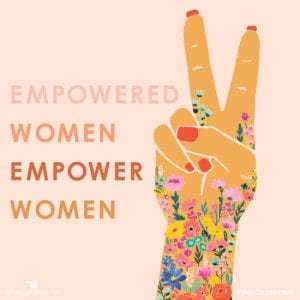
These are three powerful words that are often the mantra of feminists advocating for change. Although rippled through modern movements of feminism, history shows us, women have taken the stance as active agents in the fight to combat the oppression of the natural world connected so deeply to their own livelihood far before the empowerment shown at the forefront of the media today. Environmentalism movements led by women occur across the globe –most notably amongst those living in the Global South– as the egocentric degradation of land threatens their ability to access the very natural resources that nourish their souls. As individuals living in the Global North, we tend to overlook the privilege we have. We do not think about the labor one does to gather water for drinking, food for eating, wood for fueling, or the uneasiness in wondering if the next rainstorm or mass deforestation project will destroy the very land in which fosters our well-being.
I begin with this reflection for us to understand the power in women being activists in feminist environmentalism. The oppression of nature is linked to the oppression of women as the motive behind ecological degradation is to maintain capitalistic power, to favor profit over life. When one destroys the life of the land, they are taking resources with it. When one pollutes the land, they are contaminating the bodies of those in contact with it. The livelihood of women does not cross the androcentric mind; rather, power and control must remain intact.

Women of the Chipko movement stood in embrace of the trees that sourced their livelihood. Those at the political hands of power threatened the life of land and women as the leaves of the trees were converted to money as if life was invisible to the male gaze. The area that once produced the wood needed to make tools and provide fuel, the life that sourced photosynthesis and the air to breath, and the roots to keep the soil fertile and intact was now naked to the eyes of the androcentric mind. They say, why let a land filled with trees go to waste when companies that can generate profit for the region can utilize the space? Women fight back by saying ecology is their economy but their word is against the power of those who hold precedence in a patriarchal society. So what does one do when their word is against that of man? Women speak for the land and their life in taking action as they embrace the trunks exposed to the exploitation of man. A movement that has generated pressure in the political sector to notice the destruction of life in actions of ignorance.
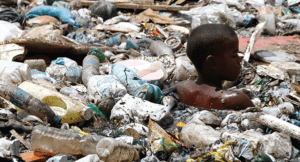
The women and children of the Brazilian slums are faced with food insecurity and economic burden as they must rummage through the garbage consuming the canals that once sustained life and nature’s beauty. Picking up can after can, hoping one day they can generate enough wealth to break them free from the debilitating life in the slums ignored by those at the top with enough wealth and power to provide for all those pleading for recognition and support. It is not until pictures of children living amongst the degradation of the land surface the media that power feels the need to speak only to take action for those pictured while the land and all remaining life is left to swim in the garbage of capitalism. Again, women are facing direct disrespect to land as they are left to care for their children while the resources needed to live are washed away.
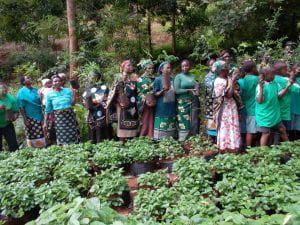
Wangari Maathai of the Green Belt Movement gathered women in the distribution of seedlings to encourage planting belts of green across the lands that have been taken from them. No longer will the soil be harmed by the effects of erosion but instead acres of trees will provide the shade, oxygen and lumber that the women who work the lands have been pleading for. As women begin to fight for the resources that sustain their life, those in authority are threatened with the words of patriarchy; women do not have a voice and neither do they behave with command. Rather than falling to the weight of subjugation, women began to develop techniques that they knew would place power and fortune into their own hands. The provision of seeds led by the movement empowered women as it was a simple task, achievable, and witnessed each day as the growth of trees flourished right before their presence. It was not aid from the government but rather their own hands that improved the quality of life for their community. As I read the story of these women who were disadvantaged in a society that favors privilege, I cannot help but think of the willpower and strength they had to watch their environment degrade, hear authority berate their value, and yet develop strategies of activism to empower each other to take matters into their own hands. This very courage was not simply an action, but rather a necessity in preserving the life of the land tied so closely to their own existence. Behind the material deprivations there are deeper issues of disempowerment as power works to interrogate, criminalize, and silence their voice in the name of patriarchy. There are deeper issues of capitalism in environmental degradation as the resources being diminished did not alter the life of the privileged but rather commodified the embodied experience of the vulnerable.
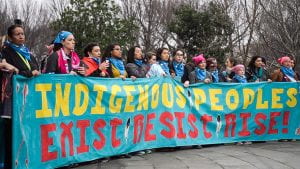
As we listen to the voices of indigenous communities, behind the cultural loss is movement to end diversity, to instill white supremacy. As corporations come to take over the land, they do not care to understand how profiting off the land will impact the livelihood of indigenous communities. They care about the dollar signs rather than the deep connection between land, body, mind, and soul. Indigenous women who experience the consequences of environmental degradation most intensely speak of the land as extended family, the dislocation of communities from the land will not be a temporary adjustment, it is a life-long loss of identity and culture. It is not just exploitation of the land but exploitation of the women’s body. As mining projects move in, violence, pregnancy, disease, and deprivation come along with them. As the land is raped of its resources, as are the women of indigenous communities, objectified by the hands of power.

Prolific The Rapper x A Tribe Called Red use music to express the violence against the land in connection to the livelihood of indigenous communities. The power of the lyrics translates emotion into the ears of listeners as we hear calls of recognition and action rather than empty promises. The provision of jobs and stimulation of the economy will not protect the land from degradation. It will not honor the sacredness of the natural world to that of the soul. Projects of exploitation fail to recognize that the land is not ours to take, it works to disconnect human life from that of all other living entities. While the media works to paint an entirely different message, the protests held by indigenous peoples are a peaceful act of activism hoping to create change while the violent acts of capitalism and patriarchy are left unspoken.

As I read about the Standing Rock Sioux protests against the Dakota Access Pipeline, I am brought to current events of the recently approved Willow Project. The $8 billion drilling project is set to occur closest to the town of Nuiqsut, home to Alaska Native populations. The construction of the land will impact subsistence activities such as fishing and hunting which increases food security amongst the community. The project is also set to increase exposure to air and water pollution threatening the health of Indigenous peoples, a contract that they did not sign. Reading about yet another project rooted in profit and power is truly disheartening as the exploitation of the vulnerable and eradication of natural resources is left to be forgotten. It is evidence that an intersectional framework is lacking in our legislature. Decisions are made with a blind lens to those that are disadvantaged in society in attempts to keep those in power in that very place. Superiority continues to be rooted in disempowerment and deprivation as we forget to remember that the land is a source of life. The disconnect does not only oppress the land, but also women who are connected in the provision of sustaining life.

Ivona Gebara provides an alternative perspective in applying faith to activism as she highlights, while the discussion of theories is occurring, so is the destruction of life. While social and environmental movements to end the oppression may bring recognition to problems, it will not work to solve the problems of patriarchy. There is no equality present in the social construction of hierarchy and she connects this to the cultural product of theology. Christian theology is rooted in the hegemonic ideals of androcentrism. Power is in the hands of men who have knowledge making perspectives–such as ecofeminism–a deviance from the expected. Gebara calls for a world in which the poor and marginalized are given the equal opportunity to live in peace through the rehabilitation of the utopian perspective rebuilt on justice. However, what is important to note is that she does not discredit spiritual values to that of material realities; rather, she wishes to diminish the structure of patriarchy that has worked to shape lives as it works to rank the value of life instead of honoring the importance of egalitarian relationships between man, woman, and all other forms of life.
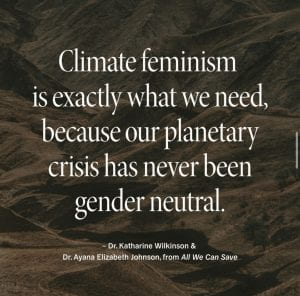
As I reflect on the movements of activism discussed above, it is evident that political reshaping of social structure is needed. History continues to repeat itself as the hands of power continue to fall disproportionately to men. This ignores the connection of ecological degradation to that of the oppression of women as profit and control continue to take the reins. Women are essentialized into a single category when attempts of action are made ignoring the intersection of identities that occur globally. It is not until we honor that women are at the forefront of environmental exploitation, that we hear the voices of those marginalized, that we elect women in representation, that we will see a world that destroys the hierarchy and values all life as their own.

Kylie,
You’re absolutely right. The only way forward is together. Change, and on the global scale that it’s needed, necessitates a blending of all marginalized voices oppressed by patriarchy to organize and mobilize as one. We can no longer spend our time and energy strictly on scholarly discourse and theory. We have to stop talking about what we should do and actually do something.
If we learned anything from our last unit in intersectional theory, it is that each person doesn’t fit neatly into a label, box, or category. We all experience privilege and oppression by our patriarchal institution at varying degrees based on a spectrum of imposed binaries. So, if all marginalized people banded together to create change, we could each capitalize on our own privileges to empower each other and an entire movement. Where one person might face oppression, another will be privileged, and vice versa.
What we have now is a system where the oppression of women and the oppression of nature are mutually reinforcing. We need to move into a space where our strengths and privileges can be mutually reinforcing to lift each other up in order to tare down the hierarchical hegemony and rebuild the utopia of our discourse in its stead.
You include the image of the quote, “Climate feminism is exactly what we need because our planetary crisis has never been gender neutral,” but I think we can widen the scope. A lack of gender neutrality at the hands of the patriarchy is an inarguable fact. However, feminists don’t have to follow in those footsteps. This quote reinforces the gender binary and leads to that essentialized thinking that excludes a multitude of diverse marginalized identities that experience similar oppression under patriarchy.
I think Intersectional Climate Feminism is the way forward to really and truly combining all the energy and power of everyone pushed down the androcentric hierarchical ladder to create actionable and lasting change.
Hi Jasmine,
Thank you for taking the time to read my blog post and comment! You are right, intersectional climate feminism is needed to address both the oppression of nature and the oppression of women to ensure all social categories of identity are understood in the marginalization of patriarchy. I include the quote at the end of this blog to highlight that the environmental crisis is gendered. Women are disproportionately experiencing the harmful impacts of harm towards the natural world and therefore, action must be taken. Thank you for pointing out this important lens.
Best,
Kylie C.
This post included many exceptional examples of Ecofeminism. I am highlighting Ivone Gebara. In my opinion, she was the most interesting female ecofeminist activist for a variety for reasons.
Ivone Gebara is a Catholic nun and ecofeminist. She is also a member of the Latin American feminist liberation theologian. Christian religious leaders are often understood as receiving a special calling from God. Gebara has noted that although women do not have a formal clerical status they often make up the majority of members In 1993, Gebara had concern for the church within the National Conference of Bishops of Brazil (CNBB) by speaking to the weekly magazine Veja that abortion was not a sin of a church. Women’s roles in the Catholic church have powerful influence. In 1995, her position on abortion earned Gebara notoriety for being silenced by the Vatican and sent for two years of theological re-education in Belgium in a theological institute. During this time she was subjected to forced silence and was condemned for criticizing the moral teaching of the Catholic Church. During that time, she received her second doctorate, in Religious Studies from the Catholic University of Louvain in Belgium. Gebara wrote a book addressing evil.
Gebara’s feminist work and her own life have inspired Christian women locally and globally to contest the androcentric theology that objectifies and diminishes women’s place within the Church. While social and environmental movements to end the oppression may bring recognition to problems, it does not always solve the problems of patriarchy. Gebara calls for a world in which the poor and marginalized are given the equal opportunity to live in peace and justice. It is important to understand that she does not discredit spiritual values to that of material realities.
Hi Catherine,
Thank you for taking the time to read my blog post and comment! I am glad to hear you also find the work of Ivone Gebara interesting. She used activism in a way that stood strong to her beliefs yet, advocated for the equality of all to live within a justice society all while urging that talking is not doing. This is critical as we analyze the movements led by women globally in environmentalism as they develop techniques to improve their livelihood to protect the life they are advocating for.
Best,
Kylie C.
Kylie –
Great work on this blog! I really loved reading it! There were quite a few things in it that really stuck out for me.
You mentioned that “When one destroys the life of the land, they are taking resources with it.” Just as they take the resources and life from the land, they are assaulting women much in the same way. You mentioned that the women are “objectified by the hands of power.” What a powerful statement and well tied in.
I could not agree more about the cycle of history that you speak of repeating itself. Sadly, this repetition of events and treatment exists because it was laid and fostered many centuries ago and is rooted in colonial capitalism. A great essay about this as it applies to women in Africa was written by Amina Mama and is called “Sheroes and Villain’s: Conceptualizing Colonial and Contemporary Violence Against Women In Africa” in which she breaks down early colonialism and how it gave birth to many of the gendered ideologies of the capitalist patriarchy in Africa. It is more relevant specifically to the violent treatment of women and the degradation they endured as the colonists were taking territories (land) and doing what they wanted with the land and the women. This resulted in many women having to move out of the rural areas due to the lack of sustainability and violence put upon them.
I think is important is that we recognize the historical cycle of love and respect that exists between women and nature and that as a result of this, there is strength in that relationship. It is a cyclical relationship based on respect, need, and interdependence. You said that “Women speak for the land and their life in taking action as they embrace the trunks exposed to the exploitation of man.” Wow. I love this statement. As I read this, I think of Leanne Betasamosake Simpson who I have referenced many times in my own writing because of her powerful presence and the way she is able to illustrate her philosophies. In her essay, “Land as pedagogy: Nishnaabeg intelligence and rebellious transformation” she beautifully narrates the relationship between women and the sapping of trees. She demonstrates how actions like this translate to the education, culture, and societal bonding of their community. It addresses what happens when this changes or is taken away. Simpson places heavy importance on the diversity of individuals and generating meaning through their context of what education is. She said, “Meaning then is derived not through content or data, or even theory in western context, which by nature is decontextualized knowledge, but through compassionate web of interdependent relationships that are different and valuable because of that difference. Individuals carry the responsibility for generating meaning within their own lives – they carry the responsibility for engaging their minds, bodies, and spirits in a practice of generating meaning” (Simpson, 11). This echoed the sentiments of Wangaari Maathai when she discusses the importance of protecting and valuing the trees as well as empowering women by affording them the opportunity to plant trees (Wangaari, 3). One could argue that this is similar to Simpson speaking of creating meaning as part of knowledge and empowerment.
Citations:
Cstraight Media -. “Key Speeches & Articles.” Speak Truth to Power | The Green Belt Movement, http://www.greenbeltmovement.org/wangari-maathai/key-speeches-and-articles/speak-truth-to-power.
Mama, Amina. “Sheroes and Villains: Conceptualizing Colonial and Contemporary Violence Against Women in Africa.” Feminist Genealogies, Colonial Legacies, Democratic …, Uzh.ch, 11 June 2014.
Guest, Special. “Ecofeminism: A Latin American Perspective (Dr. Ivone Gebara).” AllCreation.org, AllCreation.org, 22 Mar. 2023,
Simpson, Leanne Betasamosake. “Land as Pedagogy: Nishnaabeg Intelligence and Rebellious Transformation.” Decolonization: Indigeneity, Education & Society, vol. 3, no. 3, Nov. 2014.
Hi Teresa,
Thank you for taking the time to read my blog post and comment! I am pleased to read that several quotes from my blog post stood out to you. Thank you for including the source by Leanne Betasamosake Simpson, her discussion on the decontextualization of nature in Western society provides connection in the practices of patriarchy of capitalism; the trees become dollar bills rather than life that sustains so much of our own existence. The movements of activism we touched upon this week have been inspiring and empowering to read about and provides that environmentalism is motivated by those marginalized.
Best,
Kylie C.
Hi Kylie!
Your post is really well written! I was very hooked just by the first sentence, and your writing really flows well! You write about a lot of important pieces to the puzzle when to comes to activism for women and the environment, that it’s hard to reflect on all of it.
The first picture in your post, I think speaks truth to power. When I was at Hampshire College, I don’t remember exactly how I came to it, but I remember either being invited or casually joining into a protest that was happening on campus demanding reform for the title 9 process. It was run by a group of women who had, had enough of admin not doing enough for survivors. I don’t think I will ever forget that protest. We went all around campus, and even into the dining hall. We carried mattresses, and brought them everywhere, with writing all over them! My point about all of this, is that the empowered women who started the protest empowered other women (like me) and eventually other students to join. At the end of the protest, it went from 20-50 students rallying, chanting, and speaking out for a better future, and out of love for wanting a better college! I know I felt pretty empowered after that, and started to think about how I wanted to impact other women in my future. Hence, why I became a birth doula, and why I want to eventually be a midwife.
I liked how you brought reflection into your piece. It’s so important to reflect on how things are, and how things can change. You always add a lot of really important material into your blog posts, and I really value that! I am very bad at adding media, but would like to integrate it into my final project.
Standing rock was a very important televised and popularized movement that helped the word visualize what activism looks like when in the context of trying to save sacred land, and natural resources that are deeply important to the women and communities that live on it.
Gebara beautifully reminds her readers that “Violence to prepress violence will be without end. Yet, there is hope” (Gebara 97). It’s a perfect way to think about what kind of life we want to see for ourselves, for our families, and future children. There is hope for a non violent future that needs to include climate feminist action in order to lay a foundation for economic and environmental justice for all.
Hi Alina,
Thank you for taking the time to read my blog post and comment! I am glad to hear you enjoyed reading my blog entry to this week’s section on activism. Thank you for sharing your own experience with activism. Just as you describe, and similar to the movements we have read about, empowerment spreads. When we collate as a community, we empower those around us with shared experience to make a collective change that makes voices heard. What a great way to use your passion for advocacy of women by becoming a birth doula!
Best,
Kylie C.
Aw, this was an exceptionally good post. Taking the time and actual effort to create a very good article…
but what can I say… I procrastinate a whole lot and
don’t manage to get nearly anything done.
It’s remarkable to pay a quick visit this website and reading the views of
all colleagues regarding this article, while I am also keen of
getting familiarity.
Great post. I was checking constantly this blog and I’m impressed!
Very useful information specifically the last part 🙂 I care for such
info a lot. I was seeking this certain information for a very
long time. Thank you and best of luck.
Superb
slot
web-site
you have
right here.
If you wish for to take a good deal from this article then you have to apply such techniques to
your won blog.
You’re an extremely
valuable
slot
site;
could not make it without ya!
I used to be able to find good info from your blog posts.
I am sure this piece of writing has touched all the internet users, its really
really good article on building up new webpage.
Great article! That is the type of info that should be shared
across the net. Shame on the search engines for now not positioning this put up higher!
Come on over and discuss with my site . Thanks =)
I am really loving the theme/design of your site. Do you ever run into any internet browser compatibility issues?
A number of my blog visitors have complained about my website not working correctly in Explorer but looks great in Opera.
Do you have any tips to help fix this problem?
Excellent goods from you, man. I’ve keep in mind your stuff previous to and you’re simply too magnificent.
I actually like what you’ve received right here, really like what you’re saying and the way during which you say it.
You are making it entertaining and you still take care of
to stay it sensible. I cant wait to read much more from you.
That is actually a tremendous web site.
With havin so much content do you ever run into any issues of plagorism or copyright violation? My website has a lot of
exclusive content I’ve either authored myself or outsourced but it looks like a
lot of it is popping it up all over the internet without my permission. Do you
know any techniques to help stop content from being
ripped off? I’d definitely appreciate it.
We stumbled over here from a different website and thought I
may as well check things out. I like what I see so i am just following you.
Look forward to exploring your web page again.
It’s appropriate time to make some plans for the
future and it is time to be happy. I’ve read this post and
if I could I desire to suggest you few interesting things or advice.
Maybe you can write next articles referring to this article.
I desire to read even more things about it!
Hurrah, that’s what I was exploring for, what a stuff!
present here at this blog, thanks admin of this web page.
After checking out a number of the blog articles
on your website, I truly like your technique of writing
a blog. I bookmarked it to my bookmark webpage list and will be checking back soon. Take a
look at my web site too and let me know how you feel.
Круглосуточный эскорт в СПб https://spb-elite-escorts.com/
It’s going to be ending of mine day, except before finish I am reading this great piece of writing to improve my experience.
This design is steller! You certainly know how to keep a reader amused.
Between your wit and your videos, I was almost moved to start my own blog (well, almost…HaHa!) Excellent job.
I really loved what you had to say, and more than that, how you presented it.
Too cool!
I am regular visitor, how are you everybody?
This paragraph posted at this site is in fact nice.
Банкротство физических лиц в Калуге регулируется федеральным законом о банкротстве банкротство под ключ.
Процедура позволяет гражданам, не способным погасить долги, избавиться
от финансовых обязательств.
That is really attention-grabbing, You’re
a very professional blogger. I’ve joined
your feed and stay up for looking for more of your fantastic post.
Additionally, I’ve shared your website in my social
networks
Hi just wanted to give you a brief heads up and let you know a few
of the pictures aren’t loading correctly. I’m not
sure why but I think its a linking issue. I’ve tried it in two different web browsers
and both show the same outcome.
Профиль организации
Значение упаковки в торговых
и производственных процессах сложно переоценить, заняв центральное место в системе
поставок и хранения товаров.
Ключевой задачей является поддержание надежной системы
снабжения, исключающих ненужные согласования и ожидание.
Складской комплекс находится в Москве в районе с развитой инфраструктурой, в пешей доступности
от метро и удобными подъездами, благодаря чему отгрузка происходит без задержек и
в большинстве случаев выдавать
товар уже в день обращения.
Консультации предоставляются в расширенном режиме, в том
числе по праздникам, что значительно упрощает
взаимодействие.
Номенклатура и опыт
Каталог сформирован с учетом задач бизнеса любого масштаба, от стартапов
до федеральных сетей. Можно найти продукцию для склада, производства и перевозок,
а также для повседневной работы склада.
В приоритете экспертное сопровождение клиента, обеспечивающей
уверенность в правильности решения.
Качество обслуживания и доставка
Репутация компании основана на проверенном качестве продукции https://maxitel.ru/polietilenovaya-plenka-universalnyj-material-dlya-mnozhestva-zadach.html ,
поэтому при необходимости
возврат оформляется быстро и без сложных
процедур. Сотрудничество с производителями исключает лишние наценки, а отгрузки выполняются по всей территории РФ.
Персональный подход
Клиенту предоставляется индивидуальный менеджер, который помогает оформить заказ и выбрать оптимальные предложения.
Корпоративные заказчики получают ощутимые преимущества, что формирует доверительные отношения.
Открытые условия работы
В работе делается ставка на открытость и честность,
что предотвращает спорные ситуации.
Заказчик полностью информирован о
составе и сроках заказа, что является основой стабильных связей.
Решения для всех
Сервис одинаково комфортен как для небольших разовых заказов, так и для крупных
оптовых партий, что делает сервис универсальным.
Оформление заказов занимает минимум времени, что поддерживает стабильность рабочих процессов.
Howdy! I just would like to offer you a big thumbs up for
your excellent information you have here on this post.
I’ll be coming back to your web site for more soon.
This paragraph is genuinely a nice one it helps new net people, who are wishing in favor
of blogging.
You could definitely see your enthusiasm within the
work you write. The arena hopes for more passionate writers such as
you who are not afraid to mention how they believe. All the time go
after your heart.
Useful advice Thanks. Visit https://fvhospital.com
Spot on with this write-up, I absolutely think this amazing site needs
much more attention. I’ll probably be returning to see more, thanks for the advice!
Generally I do not read article on blogs, but I would like to say that this write-up very forced me to try and do
it! Your writing taste has been surprised me. Thank you, quite nice post.
Pretty element of content. I simply stumbled upon your blog and in accession capital to say that I get actually loved account your blog posts.
Anyway I’ll be subscribing for your augment or even I fulfillment you
get right of entry to constantly quickly.
Hello there, just became aware of your blog through Google, and found that it’s really informative.
I am going to watch out for brussels. I will appreciate
if you continue this in future. Lots of people will be benefited from your writing.
Cheers!
It’s actually a cool and useful piece of information. I am glad
that you just shared this helpful info with us. Please stay us up to date like this.
Thanks for sharing.
I would like to thank you for the efforts you have put
in writing this blog. I’m hoping to check out the same
high-grade content from you later on as well. In truth,
your creative writing abilities has motivated me to get my own, personal website now 😉